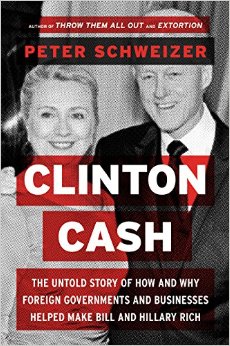May 8, 2015
Clinton Cash author admits error
by Manuela Silvestre
 Peter Schweizer made a questionable deal with The New York Times, The Washington Post and Fox News, giving them early access to the research for his book Clinton Cash. This unusual affair has become even more unusual since his research turned out to be, well, lousy (surprise!). The Washington Post and others have since pointed out the inaccuracies in Schweizer’s book, calling out its reliance on the logical fallacy post hoc ergo propter hoc. Media Matters of America went further, calling the book “a trainwreck of sloppy research and shoddy reporting that contains over twenty errors, fabrications, and distortions.”
Peter Schweizer made a questionable deal with The New York Times, The Washington Post and Fox News, giving them early access to the research for his book Clinton Cash. This unusual affair has become even more unusual since his research turned out to be, well, lousy (surprise!). The Washington Post and others have since pointed out the inaccuracies in Schweizer’s book, calling out its reliance on the logical fallacy post hoc ergo propter hoc. Media Matters of America went further, calling the book “a trainwreck of sloppy research and shoddy reporting that contains over twenty errors, fabrications, and distortions.”
Peter Schweizer gave Politico an interview on Tuesday, the day of his book’s launch, admitting “veto power” probably wasn’t the right phrase to describe Clinton’s influence in the now-infamous Russian uranium deal. That, and that he likes Marco Rubio.
At the probing of Politico’s Glenn Thrush, Schweizer said Media Matters was just “trying to muddy the water and obscure the facts in a way that’s not particularly enlightening,” adding that the media watchdog is “basically an extension of [Clinton’s] campaign.”
Schweizer’s willingness to have his research fact-checked by leading national publications is extremely puzzling. Was it born of denial? Cojones? Or maybe he did get something out of his “exclusive” deal.
As NPR points out, the Clinton campaign has started bypassing traditional media and is launching its own platform, “The Briefing,” to get its story out. This kind of political self-publishing is something to watch out for, especially as tech and social media companies are increasingly interested in becoming media companies, providing ample new platforms.
Clinton Cash may not be it, but an objective investigation into politicians’ money is well overdue.